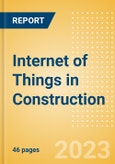The combination of labor shortages and cost-cutting measures has heightened the need for safety in the workplace, as fewer available workers must maintain productivity levels while adhering to stricter budgets, increasing the risk of onsite accidents. By deploying IoT sensors and devices throughout construction sites, companies can continuously monitor and gather data on various safety parameters. These sensors can detect potentially dangerous conditions, such as gas leaks, structural weaknesses, or hazardous temperature fluctuations, and instantly relay this information to workers and supervisors. Real-time alerts and notifications can be sent to workers' wearable devices, ensuring they are aware of any imminent threats.
Key Highlights
The construction industry is widely considered one of the least digitized industries and has been slower to adopt AI than other sectors. This is due to a number of unique challenges the industry faces. Historically, computers did not have the processing power necessary to crunch the data needed for BIM, as it is often vast and unstructured. Access to this data was also notably inconvenient. However, in 2023, due to developments in computer power, semiconductors, and cloud computing, which facilitates data sharing, AI implementation has grown considerably.IoT technologies are key to digitalization in the construction industry. Sensors, asset monitors, wearables, and integration with BIM can all improve safety, productivity, and, therefore, profit margins. For an industry that has large sites to manage, strict project timelines, hazardous working conditions, and tight profit margins, IoT can create a manageable view of construction sites for project managers, streamline operations, and protect workers.
Scope
- This report provides an overview of the IoT theme. The detailed value chain comprises of five layers: physical layer, connecitivity layer, data layer, app layer, services layer. Leading and challenging vendors are identified across both segments.
- It identifies construction challenges, such as ESG, labor shortages, and safety, and an impact assessment of IoT on the construction industry, addressing these challenges.
- It includes three case studies, outlining market-leading use cases of IoT in construction to enhance building monitoring capabilities, equipment maintenance, and develop a connected worker safety system.
- It contains comprehensive industry analysis, including forecasts for IoT revenues to 2030, and insight from the Job Analytics and Patent Analytics databases.
- The report has extensive coverage and analysis of relevant companies’ positions in the IoT theme. This includes leading adopters, vendors, and specialist IoT vendors in construction.
- It includes the unique thematic scorecard that ranks construction companies according to their positioning in the ten themes most important to the industry, of which IoT is one.
Reasons to Buy
- This report will help you to understand IoT and its potential impact on the construction sector.
- Benchmark your company against your competitors, by comparing how prepared 46 companies in the construction sector are for IoT disruption.
- Identify and differentiate between the leading IoT vendors and formulate an adoption plan for your company.
- Position yourself for future success by investing in the right IoT technologies. Cut through the noise with the publisher's priority ratings for each IoT technology for each segment of the industry (conceptual design, feasibility studies, planning and permitting, financing, design and engineering, construction, and operations and maintenance).
- Develop relevant and credible sales and marketing messages for construction companies by understanding key industry challenges and where IoT use cases are most useful.
- Identify attractive investment targets by understanding which companies are most advanced in the themes that will determine future success in the construction industry.
Table of Contents
- Executive Summary
- Players
- Construction Challenges
- The Impact of IoT on Construction
- Case Studies
- Market Size and Growth Forecasts
- Signals
- IoT Value Chain
- Companies
- Sector Scorecard
- Glossary
- Further Reading
- Thematic Research Methodology
- About the Analyst
- Contact the Publisher
- Key players in the IoT value chain
- Key challenges currently facing the construction sector
- The IoT value chain
- Adopters
- Vendors
- Scorecards
- Glossary
- Further reading
- Glossary
- IoT-related keywords with the most mentions in the construction sector, last five years
- IoT Investment Matrix
- Cisco smart building solution
- ACECO smart crane system
- CAT connected worker platform
- Global IoT revenue forecast in construction by product and services, 2019-
- Number of IoT patent publications in the construction sector, Jan 2013 - Sep
- IoT job postings in the construction sector each month, Sep 2020 - Oct
- Top ten IooT related IoT job posters in construction, Sep 2020 - Sep
- IoT value chain
Companies Mentioned (Partial List)
A selection of companies mentioned in this report includes, but is not limited to:
- Advantech
- Alphabet (Google)
- Amazon
- Apple
- Bosch
- Fujifilm
- Hikvision
- Lenovo
- Alibaba
- Arista Networks
- Cisco
- Dell Technologies
- Deutsche Telekom
- Ericsson
- Fortinet
- Alteryx
- Baldu
- Databricks
- IBM
- ABB
- Accenture
- AltSource
- Arup
- Atos
- Bentley Systems
- Biz4Group
- Cognizant
- AECOM
- Honeywell
- Larsen & Toubro
- Shimizu
- Siemens
- Ferrovial
- POSCO
- Balfour Beatty
- Vinci
- PCL Construction
- Built Robotics
- Proxxi
- Ynomia
- Zoomlion
- GreenVibe
- Samsung
- Trimble
- NavVis
- Maturix
- Viloc
- VisuaLynk
- Microsoft
- Nvidia
- Rockwell Automation
- Shimadzu
- Arm
- Sony
- TKD
- Veoneer
- Juniper Networks
- Nokia
- Orade
- Orange
- Sierra Wireless
- NetApp
- Oracle
- Palo Alto Networks
- Qualcomm
- SAP
- SAS
- Snowflake
- PTC
- Salesforce
- Samsung Electronics
- Schneider Electric
- Tesla
- Huawei
- Infineon
- McKinsey
- Mott McDonald
- Tata Consultancy Services







